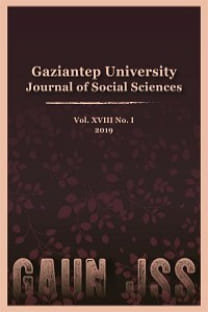Putting Heart and Soul in Education: Spiritually Intelligent Servant-Leaders In Educational Institutions
Ruhsal zekâ ve hizmetkâr liderlik anlayışı birbiri ile çok yakın ilişkide olan iki ortaktır.İnsanlarla ilişkilerinin odak noktada olduğu diğer alanlarda olduğu gibi eğitim alanında daeğitimcilerin görevi, ruhsal zekâ yaklaşımıyla hedef kitlelerinin farklı beklentilerini,isteklerini öğrenmek ve bu görevlerle etkin biçimde başa çıkmaktır. Eğitimciler hem sınıfortamında hem de yönetsel düzeyde faaliyet gösteren liderler olarak, bağlı oldukları eğitimkurumlarında uyumlu iletişim iklimi oluşturmak için insancıl yaklaşımı benimseyen birerruhsal zekâlı hizmetkâr liderlere dönüşmelidirler.Bu çalışmanın birincil amacı, Türk yaşam dokusunun ayrılmaz parçaları olan ruhsallık,ruhsal zekâ ve hizmetkâr lider kavramlarını, bir arada kullanarak Türk literatürünekatmaktır. İkinci aşamada ise, literatür sınırları içinde ve eğitimci perspektifinden ruhsalzekâlı hizmetkâr liderlerin eğitim örgütlerindeki rolleri tartışmaktır.
Eğitime Kalbini ve Ruhunu Katmak: Eğitim Kurumlarında Ruhsal Zekâlı Hizmetkâr Liderler Olmak
Spiritual intelligence (SQ) and servant-leadership understandings are hand-in-glove partners. Like many other fields dealing with people, in education it is educators' duty to cope with different expectations, wishes and duties of their target audiences with virtuous approach of SQ. Therein educators have to enhance their humanistic understanding to create harmonious communication climates in their educational institutions that mainly require and value spiritually intelligent servant-leaders working both in the classroom and on the administrative level. The aim of this paper in the first place is to highlight concepts that are the cardinal values of Turkish daily fabric like spirituality, spiritual intelligence, and servant-leadership. Even though these inseparable values of Turkish culture are well known and can be found in the fabric of daily life, it is hard to find all of them discussed under a common topic related with each other in literature. In the second place, within the limits of the paper the undeniable importance of spiritually intelligent servant-leaders' (SQS-Ls) contributions in educational institutions is explained and the understanding from the educators' perspective is discussed within the limits of literature search.
___
- Andersen, J. A. (2009). When a servant-leader comes knocking... Leadership & Organization Development Journal, 30 (1), 4-15.
- Crippen, C. (2005). The democratic school: first to serve, then to lead. Canadian Journal of Educational Administration and Policy, 47 (5).
- Davies, A. (2007). Best practice in corporate governance. Burlington: Gower Publishing.
- Emmons, R. A. (2000). Is spirituality an intelligence? Motivation, cognition, and the psychology of ultimate concern. The International Journal for the Psychology of Religion, 10(1), 3-26.
- Fluker, W. E. (2008). Spirituality, ethics, and leadership. Spirituality in Higher Education Newsletter, 4 (3), 1-6.
- Fry, L.W. & Slocum JR, J. W. (2008). Maximizing the triple bottom line through spiritual leadership. Organizational Dynamics, 37 (1), 86-96.
- Fry, L.W. (2003). Toward a theory of spiritual leadership. The Leadership Quarterly, 14 (6), 693-727.
- Greenleaf, R. K., Beazley, H., Beggs, J. & Spears, L. C. (2003). The servantleader within: A transformative path . New Jersey: Paulist Press.
- Greenleaf, R. K. (2002). Teacher as servant: A Parable. Indianapolis: Robert K. Greenleaf Center.
- Grizzell, B. C. (2008). Institutional servant leadership: A catalyst for urban community sustainability. Academic Leadership the Online Journal, 6 (2), Retrieved January 10, 2008, from http://www.academicleadership.org/ emprical_research/353.shtml.
- Jain, M. & Purohit, P. (2006). Spiritual intelligence: A contemporary concern with regard to living status of the senior citizens. Journal of the Indian Academy of Applied Psychology, 32 (3), 227 - 233.
- Reave, L. (2005). Spiritual values and practices related to leadership effectiveness. The Leadership Quarterly, 16 (5), 655-687.
- Rossiter, A. (2006). Developing spiritual intelligence: The power of you. UK: O Books.
- Selman, V., Selman, R. C., Selman, J. & Selman, E. (2005). SpiritualIntelligence/Quotient. College Teaching Methods & Styles Journal, 1(3), 23-30.
- Sendjaya, S. & Sarros, J. C. (2002). Servant Leadership: Its Origin, Development, and Application in Organizations. Journal of Leadership & Organizational Studies, 9 (2), 57-64.
- Sisk, D. (2008). Engaging the spiritual intelligence of gifted students to build global awareness in the classroom. Roeper Review, 30 (1), 24-30.
- Spears, L. (1996). Reflections on Robert K. Greenleaf and servant-leadership, Leadership & Organization Development Journal, 17 (7), 33-35.
- Steingard, D. S. (2005). Spiritually- informed management theory toward profound possibilities for inquiry and transformation. Journal of Management Inquiry, 14 (3), 227-241.
- Toduk Akiş, Y. (2003). Business leadership and management: Current practices in Turkey. In A. Safty (Ed.), Value leadership (pp. 412-428). İstanbul: University of Bahçeşehir Publications 9, the School of Government and Leadership Publications 4.
- Vaughan, F. (2002). What is spiritual intelligence?. Journal of Humanistic Psychology, 42 (2), 16-33.
- Zohar, D. & Marshall, I. (2006). SQ: Connecting with our spiritual intelligence. New York: Bloomsbury.
- ISSN: 1303-0094
- Yayın Aralığı: Yılda 4 Sayı
- Başlangıç: 1991
- Yayıncı: Gaziantep Üniv. Sosyal Bilimler Enst.
Sayıdaki Diğer Makaleler
Sosyal Medya Ağlarının Sosyal Ticaret Ağına Dönüşümü: Facebook Örneği
Karkamış'ta Yerleşmenin Tarihsel Gelişiminde Etkili Coğrafi Faktörler ve Antik Karkamış Şehri
XIX. Yüzyılın Son Çeyreğinde Ayntab'ın Sosyal ve Ekonomik Durumundan Bir Kesit
Quality and Its Reflection to the History and the Period of Prophet Muhammad
Burcu ÖKSÜZ, Müjde KER - DİNÇER
Asimetrik Bilgi, Banka Kredileri ve Reel Sektör Arasındaki İlişkilerin Ampirik Analizi
Serdar KURT, Recep TARI, Şehnaz Bakır YİĞİTBAŞ
Oğuzhan SEVİM, Behice VARIŞOĞLU
Dinin Bireyselleşmesi: Üniversite Gençliği ile Bir Ölçek Çalışması
Selda İÇİN AKÇALI, Kamile Oya PAKER
Analysis of Asset/Liability Structure of Banks Operating in Turkey
